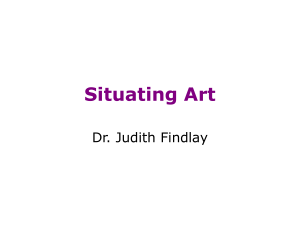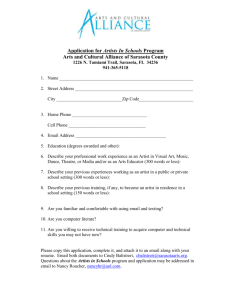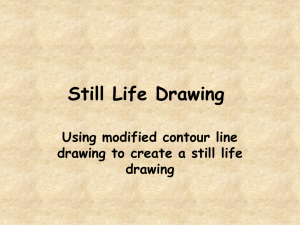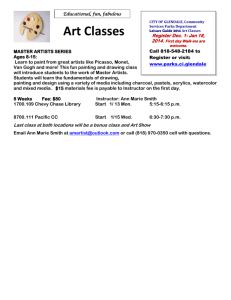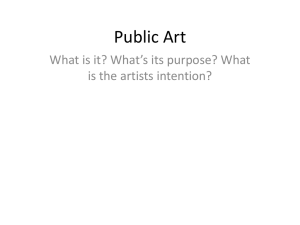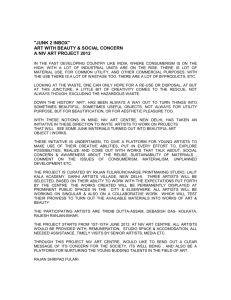La Pocha Nostra: Manifesto
advertisement
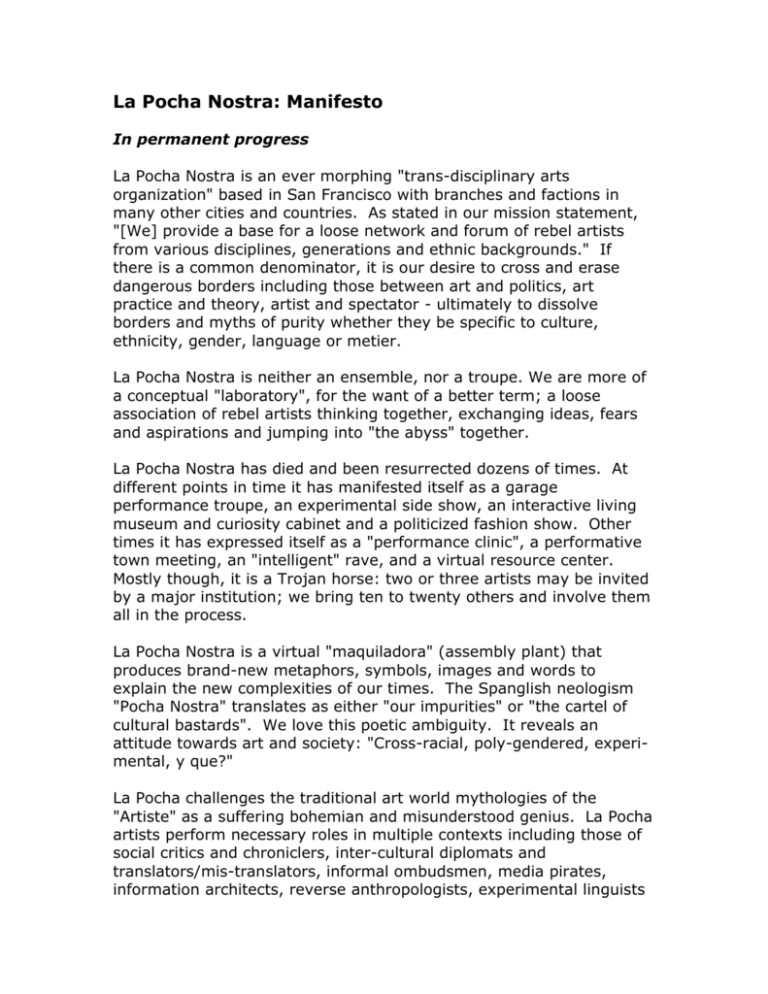
La Pocha Nostra: Manifesto In permanent progress La Pocha Nostra is an ever morphing "trans-disciplinary arts organization" based in San Francisco with branches and factions in many other cities and countries. As stated in our mission statement, "[We] provide a base for a loose network and forum of rebel artists from various disciplines, generations and ethnic backgrounds." If there is a common denominator, it is our desire to cross and erase dangerous borders including those between art and politics, art practice and theory, artist and spectator - ultimately to dissolve borders and myths of purity whether they be specific to culture, ethnicity, gender, language or metier. La Pocha Nostra is neither an ensemble, nor a troupe. We are more of a conceptual "laboratory", for the want of a better term; a loose association of rebel artists thinking together, exchanging ideas, fears and aspirations and jumping into "the abyss" together. La Pocha Nostra has died and been resurrected dozens of times. At different points in time it has manifested itself as a garage performance troupe, an experimental side show, an interactive living museum and curiosity cabinet and a politicized fashion show. Other times it has expressed itself as a "performance clinic", a performative town meeting, an "intelligent" rave, and a virtual resource center. Mostly though, it is a Trojan horse: two or three artists may be invited by a major institution; we bring ten to twenty others and involve them all in the process. La Pocha Nostra is a virtual "maquiladora" (assembly plant) that produces brand-new metaphors, symbols, images and words to explain the new complexities of our times. The Spanglish neologism "Pocha Nostra" translates as either "our impurities" or "the cartel of cultural bastards". We love this poetic ambiguity. It reveals an attitude towards art and society: "Cross-racial, poly-gendered, experimental, y que?" La Pocha challenges the traditional art world mythologies of the "Artiste" as a suffering bohemian and misunderstood genius. La Pocha artists perform necessary roles in multiple contexts including those of social critics and chroniclers, inter-cultural diplomats and translators/mis-translators, informal ombudsmen, media pirates, information architects, reverse anthropologists, experimental linguists and radical pedagogues. To us the artist is above all, an active, responsible citizen immersed in the great debates of our times. Our place is the world and not the Art World. La Pocha is by nature anti-essentialist and anti-nationalist. We are this and that and everything in between. For the moment we claim an extremely unpopular position in the US: "No homeland; no fear; no borders; no patriotism; no nation-state; no ideology; no censorship". We are committed to presenting a different face of America", a polycultural and diversified "America" with an internationalist, humanist and progressive perspective which has little or nothing to do with US unilateralism, the Bush doctrine or the Patriot Act. La Pocha practices collaboration across national borders, race, gender and generations as an act of citizen diplomacy and as a means to create "ephemeral communities" of like-minded rebels. The basic premise of these collaborations is founded on the idea that if we can negotiate difference on stage or around a table, we can certainly do it in the social sphere. If we learn to cross borders on stage, we may learn how to do so in the world. And, we hope others will be challenged to do the same. La Pocha is an ever-changing community. It is constituted by whoever is sitting at the table at any given moment. It can be two people; it could be fifty. Through our performance praxis and pedagogy, wherever we go, we try to build more open, fluid and tolerant communities defying dysfunctional or dated notions of identity, nationality, language and art making. And some of the new members we encounter on the road become long-time collaborators. La Pocha functions through an open belief system. We strongly trust in the idea that consciousness can be stimulated through nontraditional presentational formats, and therefore we view performance as an effective catalyst for thought and debate. Through sui-generis combinations of artistic languages, new media and surprising performative formats, we explore the interface of globalization, migration, hybrid identities, border culture, and technology. Our rehearsals and workshops, weekly staff meetings and quarterly board meetings always involve intense conversations focused around current hot topics, the pertinence and ability of performance to address them and the changing role of the artist within society. (Increasingly, since 9/11, we have been dealing with censorship, intolerance and paranoid nationalism. There has been no other option. If there is an implied text in everything we are currently doing, it is this: "We are caught in the crossfire between two forms of fundamentalisms, and we are all trying to find a way out. Maybe performance art can help. Let"s give it a try.") La Pocha is a bridge between theory and praxis. Throughout the years, we have embarked on the creation of performative-ritual formats intended to encourage public dialogue. We hope these formats are less authoritarian and static than those we see in academia, pop culture and politics. We constantly challenge theorists to be more performative and artists to be more intellectually savvy. Most of the time it works. Every now and then, we engender a monster, and that"s also fine. La Pocha provides regenerative sources of labor, and a fluid structural system built from concentric and overlapping circles. The inner circle comprises six to eight artists, and scholars whose membership is determined by their degree of commitment and available time. The following circle includes performance artists, musicians, filmmakers and designers working part time on several projects sometimes spanning many years of La Pocha"s work. Then there is a series of outer and overlapping circles of artist associates, theorists and producers who live in other cities and other countries. They join in occasionally, when the project, time and place are right. Members and associates can move from one circle to another. This depends on their other commitments, availability to travel and work and the needs of each project. The constant change of membership inevitably alters the nature of the work and contributes to the permanent process of reinvention. Pocha was created out of our necessity to survive as Chicano artists in a racist Art World. Pocha is a direct and pragmatic response to the lack of funding to artists of color in the US. The fact is that Chicanos and other "artists of color" don"t have the funding support enjoyed by the Anglo avant garde. Because of this, we must respond with complexity and imagination to the endemic lack of funds and access we have been forced to endure. La Pocha is an ongoing workshop where performance pedagogy performs a major role in our political praxis. Why? In our opinion, it challenges authoritarian hierarchies and specialized knowledge by attempting to create temporary utopian spaces where interdisciplinary dialogue and imagination can flourish. These utopian spaces are framed by, but not contained within a pentagon-shape of radical ideas whose vertices are community, education, activist politics, new technologies, and experimental aesthetics. The pentagon is the performance object, where all the vertices finally connect. La Pocha is a unique aesthetic. Our "robo-baroque" and "ethnotechno-cannibal aesthetic" samples and devours everything we encounter: Border and Chicano pop culture; TV; film; rock and roll; hip-hop; comics; journalism; anthropology; pornography; religious imagery and of course, the history of the visual and performing arts. What we do as performance artists is to cross-reference this information, "embody" it, and then re-interpret it for a live audience, thus refracting fetishized constructs of otherness through the spectacle of our "heightened" bodies on display. La Pocha"s aesthetic praxis involves ethnic and gender-bending, cultural transvestitism and constant, atypical and surprising power inversions. The culmination of many of our images show women and/or people "of color" in control. In our world, cultural borders have moved to center stage while the alleged mainstream is pushed to the margins, treated as exotic and unfamiliar, placing the audience member/viewer in the position of a "foreigner" or a "minority". It sounds "heavy" but its actually a lot of fun. La Pocha is currently crossing a dangerous aesthetic border: Ceding both our will, and the stage to the audience; and inviting them to cocreate and to participate in our "extreme performance games" riddled with post-colonial implications, are integral aspects of the new phase of our work. La Pocha is an ever growing archive comprising thousands of photographs, videos, books, magazines, soundtracks, documents, props and costumes. We are permanently searching for interns to help us to organize it into some kind of functional working archive. Sadly, we have never had enough hands, space or filing cabinets to complete this task. We are currently in the process of turning our video archives into a DVD series for educational purposes. The first one of the series is already available. La Pocha is an informal service organization. Wherever we are invited to perform, besides providing ethno-techno body language, imagery and poetics, we offer new ways of thinking about art and community, a radical pedagogy to attain it, and informal advice on multicommunity outreach and new audience development. It"s part of the "Pocha package". La Pocha is above all a utopian idea. But our "utopia" is only a marker in the political distance, a philosophical direction, or path, which we often loose. Unfortunately, our frail egos and frequent financial hardships cause us to fall occasionally into our own personal void and temporarily forget our goals. So, it is our responsibility to continually remind each other and recapture our strength and clarity. La Pocha is committed to a permanent process of reinvention, which responds to the vertiginous changing nature of our bizarre epoch. Unfortunately permanent reinvention and ever shifting multidimensionality contradict sustainability, and this is one of our systemic problems. Clearly, our main weaknesses are in the highways of sustainability and continuity. How do we solve this dilemma? We still don"t know but we are willing to accept suggestions. By the time this "open text" is published, La Pocha may be something else, and its membership and projects may have dramatically changed. By publishing this text we truly hope to inspire our colleagues - whether they be artists, theorists, educators or activists to develop similar models. You are all welcome to pirate any of these ideas.
